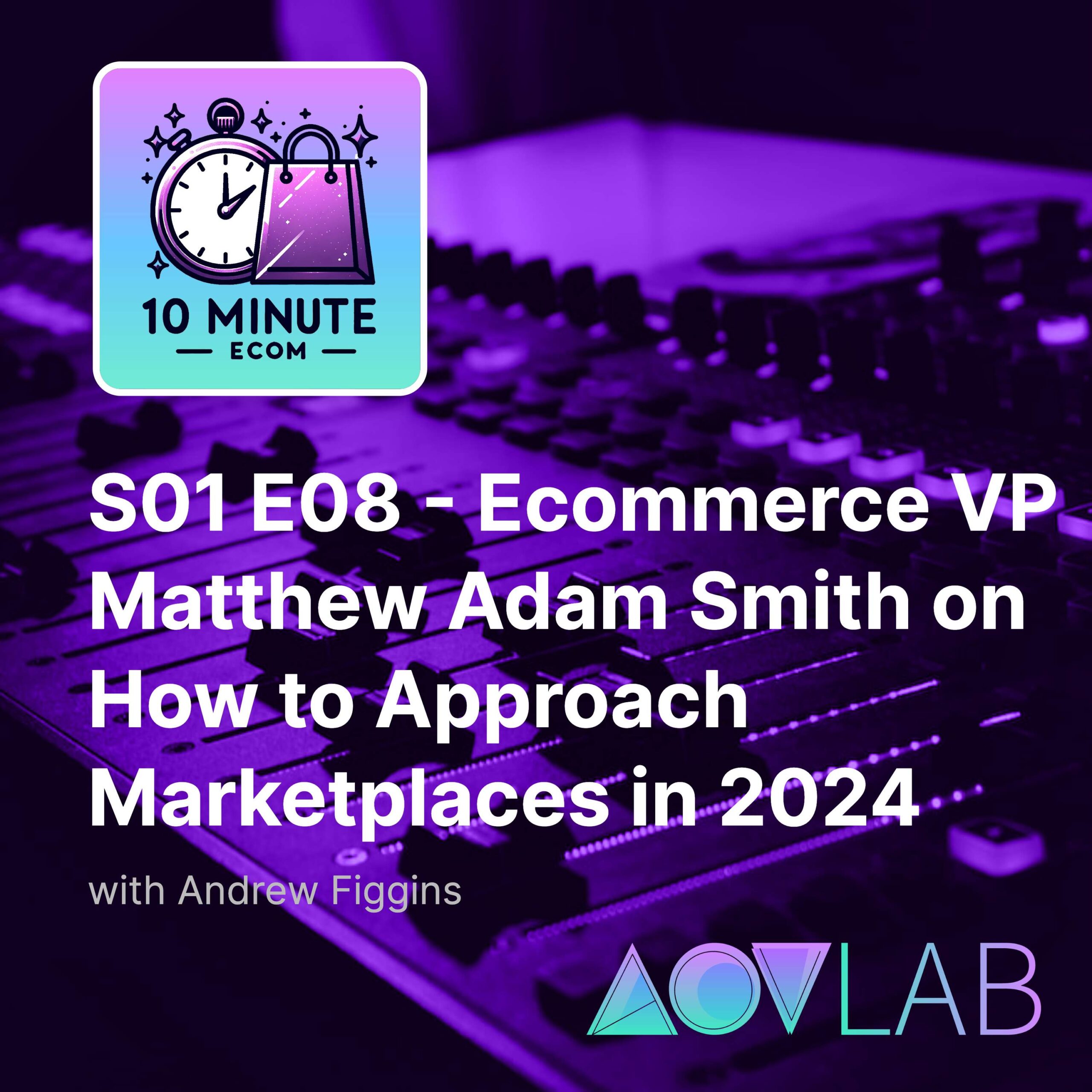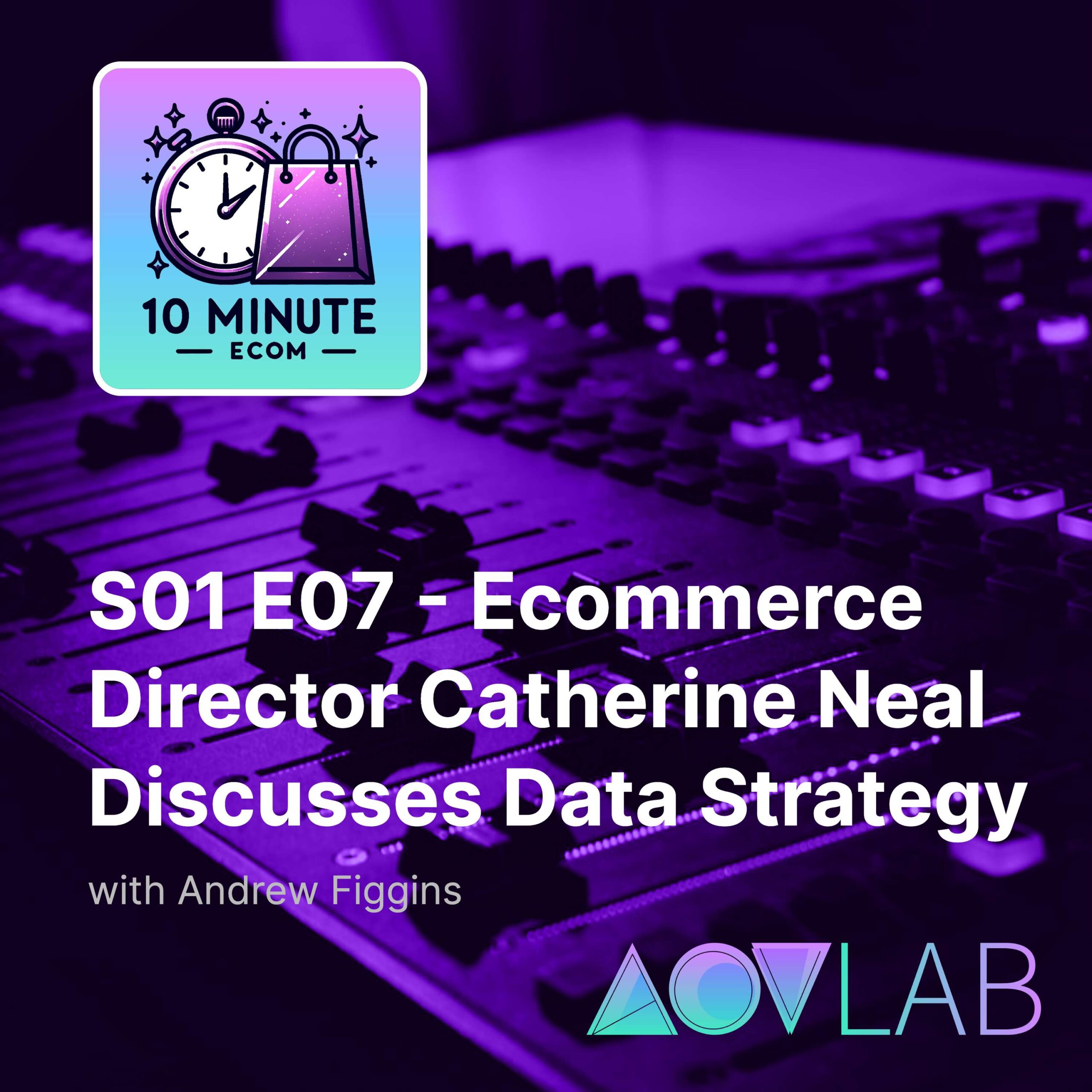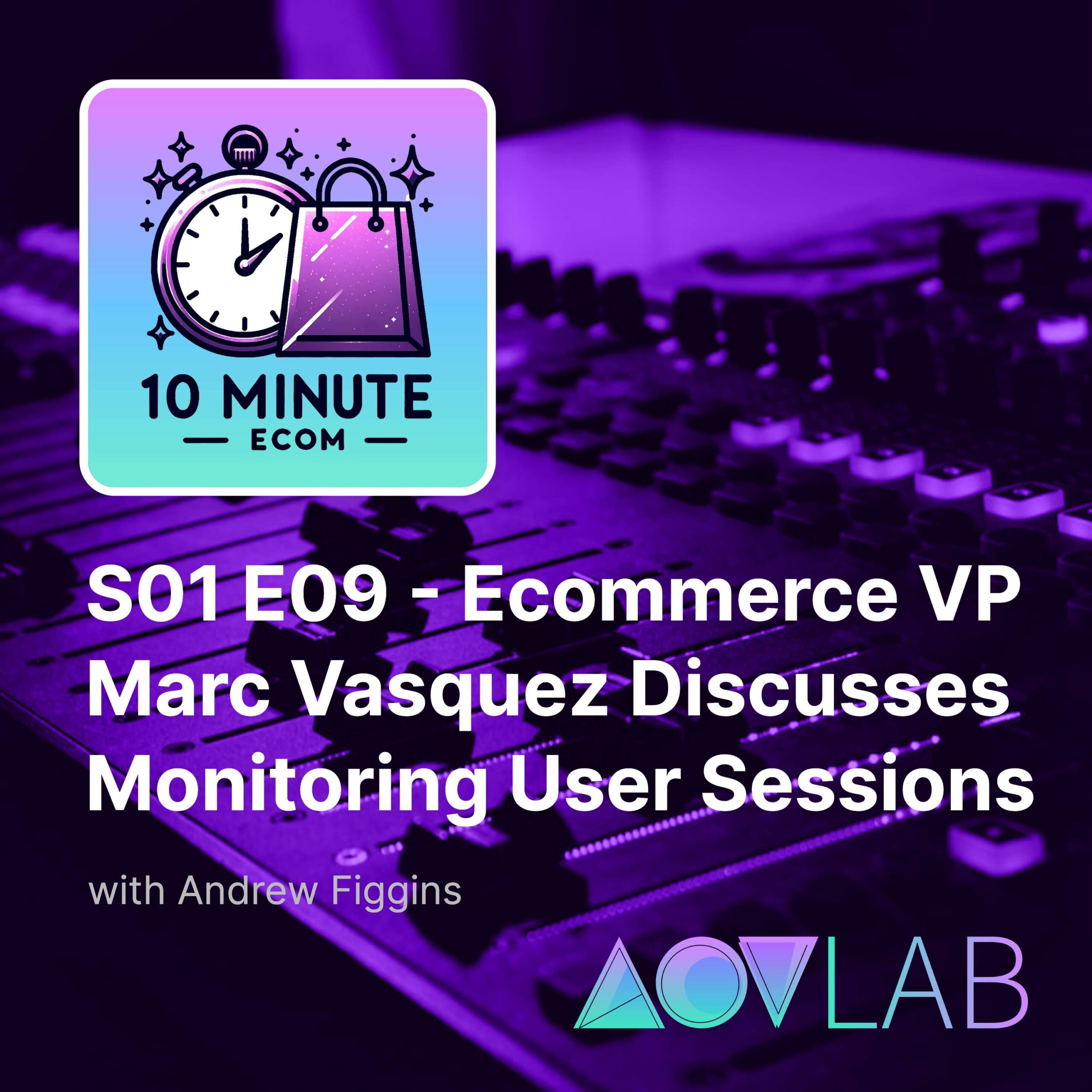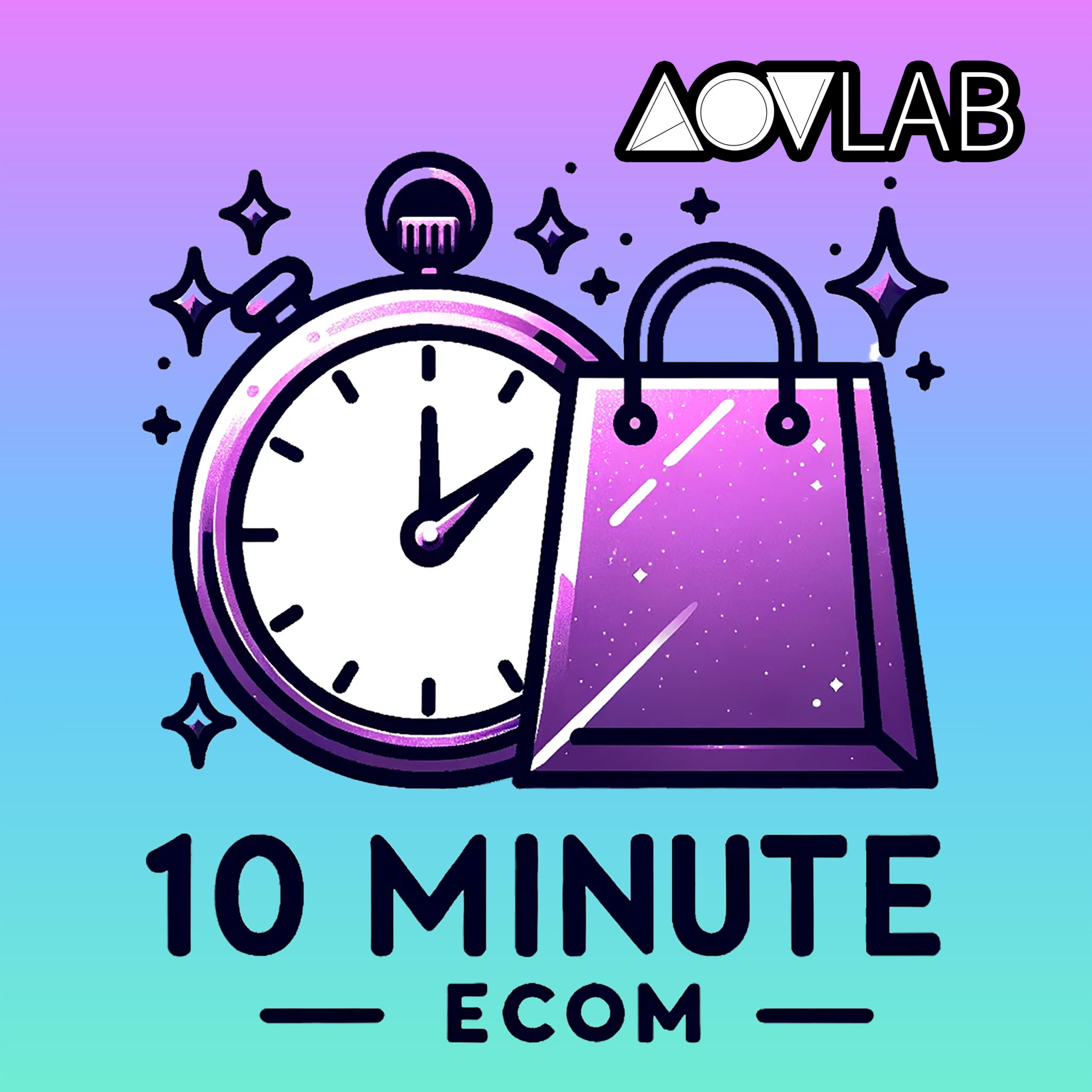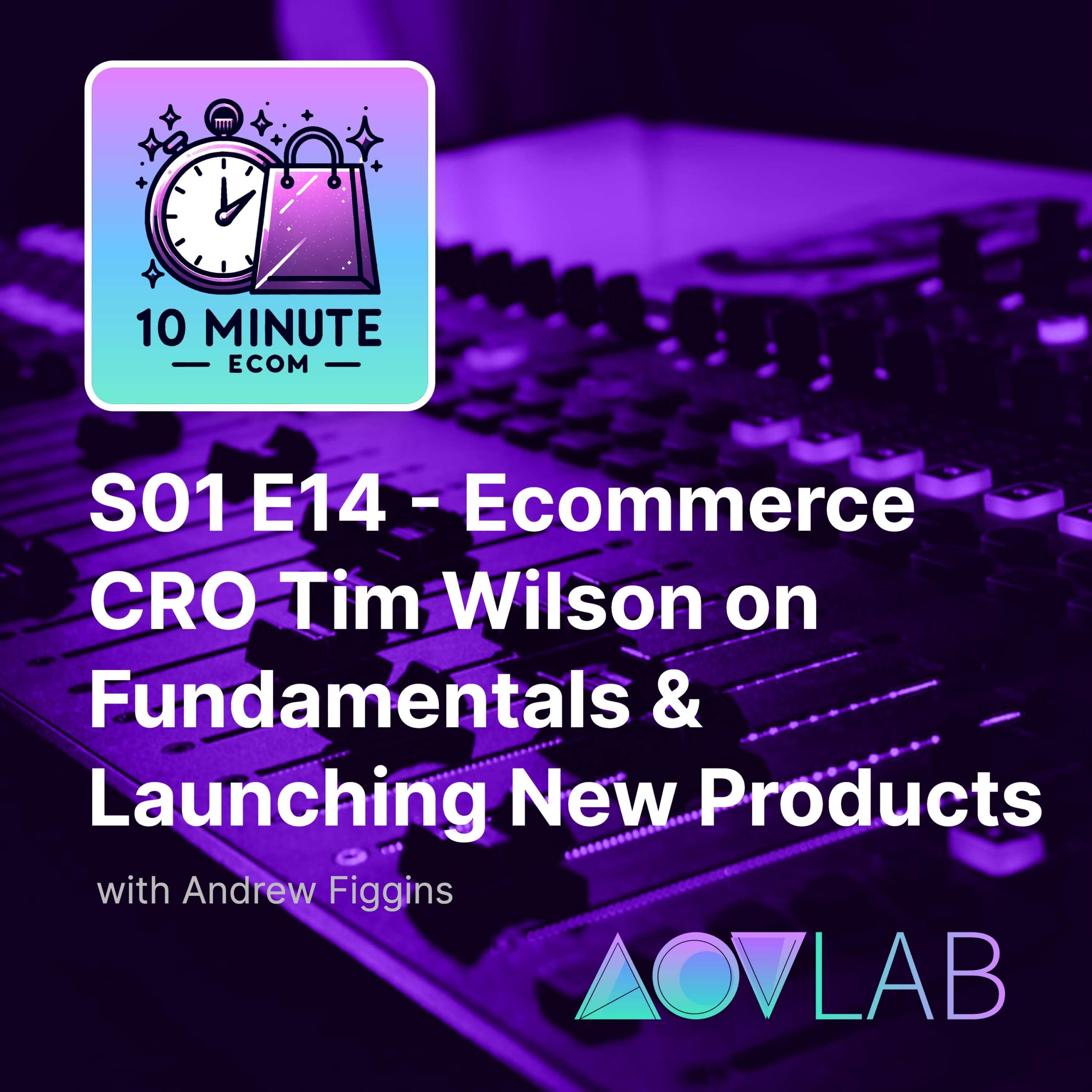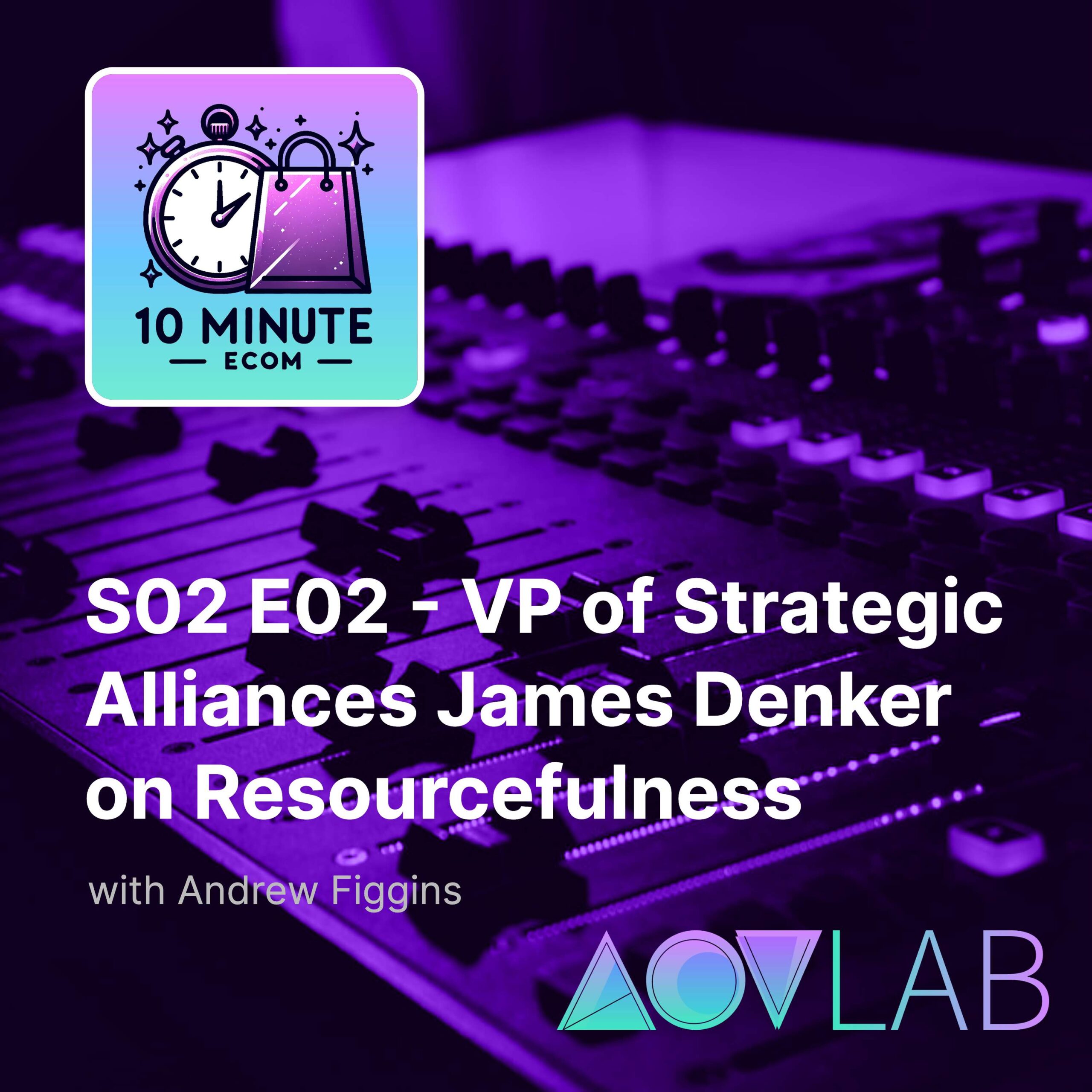Guest: Matthew Adam Smith, Ecommerce CEO, MAS Commerce Host: Andrew Figgins, Founder, AOV Lab Episode Synopsis:Matthew recently left Walmart and has launched his own company, MAS Commerce. Matthew shares from his deep marketplace and retail media experience with Walmart, focusing in on how brands can diversify their marketplace approach. He also shares several insights he has gathered from his work supporting marketplace sellers in recent years. Transcript: [00:00:15] Andrew: Hello Ecommerce fans, and welcome to 10-Minute Ecom, an AOV Lab podcast. Every episode, we break down a new and different tactic that can help you improve your ecommerce KPIs (key performance indicators). I’m […]
View Full Transcript
Episode Transcript
[00:00:16] Speaker A: Hello, ecommerce fans, and welcome to ten minute Ecom, an AOV Lab podcast. Every episode, we break down a new and different tactic that can help to improve your e commerce. KPIs key performance indicators. I'm your host, Andrew Figgins, and like most of you, I am an ecommerce professional. You may know me as the founder of AOV Lab, the former vp of digital product innovation at scrubs and beyond, or as the former director of e commerce technology at Rural King, or just from LinkedIn. Today I'm excited to be talking to Matthew Adam Smith, an e commerce colleague that has held a variety of interesting roles in e commerce, including leading the marketplace and media teams at Walmart Fortune number one.
Matthew, what did you come on the show to share today with your e commerce colleagues?
[00:01:07] Speaker B: Hello, e comm warriors. This is Matthew Adams Smith coming to you after about five years at Big Blue, the big house Walmart, where I was really fortunate to be on the launch teams of the two latest innovations there, the two biggest growing businesses, which are the launch of the retail media network Walmart Connect, and then more recently, the third party marketplace, where I got to have a front row seat running strategy and business development, particularly around seller acquisition. But my door into Walmart was really to launch the media group and then later the third party marketplace. And so that's just been a thrill to get that level of access within the largest company in the history of the planet and to be in those laboratory spaces that are critical for the future of the company and to watch that kind of a legacy organization try to reform itself and be actively working to reform itself. I got to do that stuff. So the change management and the relationships was just really a thrill. And I got to say, it was a fire hose of learning every day and just surrounded by, I think, the best and brightest talent ever had the fortune to really work with in my career.
[00:02:13] Speaker A: Well, thank you, Matthew. This episode was a fire hose of learning for me. And Matthew shares his tactic a little bit later in the episode, which is how he recommends brands approach marketplace opportunities.
We'll get right into it right after this ad.
[00:02:29] Speaker C: Today's episode of ten minute Ecom is brought to you by Optiversal. Optiversal provides aigenerated SEO landing pages that can help you rank and earn organic traffic for keywords you don't currently rank for. Their software is being used by some of the premier brands in ecommerce, like Best Buy, Petco, and Tractor Supply Co. I was Optiversal's customer at Scrubs and beyond and saw firsthand how Optiversal started from scratch and built a multimillion dollar organic traffic channel. Their technology 100% works. Go to aovlab.com and click on Vendor Network to set up your 30 minutes discovery call with Optiversal.
And now back to the show.
[00:03:14] Speaker B: Don't get me wrong, I put a lot of blood, sweat and tears into it, but been a really, I think, important jumping off point for me and what I'm up to next, which is really all about leaning into where AI is going to take us, trying to fuse those business KPIs with societal ones. I am now just a few days post the announcement of my own thing, which is mass movement, which is I think the world's first consultancy and agency focused on helping retailers, platforms, brands, et cetera, in whatever their version of business transformation is, where AI, both an approach from AI and also specific AI tactics and tools, can be used to scale and drive not just their productivity and their profitability.
[00:04:00] Speaker D: Yeah, there's so much happening right now with AI. We could spend many ten minute sessions talking about AI and everything about it from your past work, Matthew, in the marketplace space, we were just chatting about this a little bit before we hopped on today, but just about that resistance that some retailers still have with the idea of selling outside of their own warehouse or outside of, to their own customers. But I was asking you a little bit about your role with Walmart. Did you even experience that resistance? Did you hear about that? Or by that time had those retailers just, had they gotten over the hurdle of that barrier?
[00:04:40] Speaker B: Yeah, I think it took different forms. Right. Because this is where it helps to appreciate where we've come from, which is legacy retail being about scarcity, control, and just first party owned merchandise where retailer controls most of the variables in agreement with the manufacturer. So Procter and Walmart get together once a year and then review quarterly and even monthly at various levels their goals for the business and that idea. And I think Amazon was first breakthrough that, because if you look at Amazon's business today, it's nearly two thirds third party marketplace sellers. The obvious advantage for that is it reduces the risk for a retailer in terms of carrying the merchandise, so greatly reduces financial risk, but it also can greatly increase legal risk and liability and risk to your customers experience, et cetera, because you're seeding control over things like what kinds of products are going to come and how good are the listings going to look. Will there be enough images? Will the accuracy on the product labels and in the listing be up to our standards? Walmart being based in Arkansas, the laws there around this topic are even stricter than those governing some actors like Amazon and Fiat. It's definitely a calculation, I think. And so you have to put a lot of rigor into the systems that will ensure bad actors can't find a home, and that good actors have every tool and every opportunity to shine and to thrive. But other retailers out there who have chosen to either not open up their platform as a marketplace or to do so in a very curated way. And so I think it's a business calculation, and it's a calculation about what you believe your responsibility of your customer is and balancing that with the business opportunity. But end of the day, I think the train has left the station in terms of can any one retailer really command any major scarcity and control? No. Right? Because we've all been trained now to operate in an item based universe. And whether that means your item based universe is going to Amazon as your default search engine and engaging with the items there, and all those sellers are competing with each other at great density, especially now with it being so saturated, it's really harder and harder to win that sale. Or if you are somebody that just likes Google or Bing and you find your way to an offer that way. And fun fact, Amazon is about 90% organic on site sales right now, whereas Walmart, about 40 or 40 something percent on the odd month are originating from a web search. So that opens up a lot of really interesting ideas about how you can find new customers, how customers can consider different marketplaces. But ultimately, I don't think the loyalty of a customer to a certain major sort of mass retailer platform is about anything other than I think I can get the best product or the best price, the best customer service, the best shipping, et cetera. I think Timu really throws that last consideration or second to last consideration into a challenging space because Amazon trained us all and then Walmart has been reinforcing and others have, that we have to get the product quickly like customer demands. Two day or better. Now it's one day or better. That's same day, two hour. And Timu basically proved, actually no, if it's really cheap, they'll wait for.
So yeah, short answer is marketplaces are here to stay. They're ultimately a really good thing because they just drive selection, they drive choice, and they create mass competition between millions of sellers to just get the best products at the best price and best offer to the customer. So customer wins. But retailers are definitely doing their own calculus to manage that opportunity against the risk they assume by letting different businesses onto a domain that they own. And it's a shift in risk from the old approach, which was only our owned inventory is on our platform. Choice is greatly reduced for customer right, but risk is also greatly reduced for the retailer in terms of legal risk and compliant risk. But on the other hand, they also assume all the financial risk of having made their bets weeks, months, often more than a year ago during a mod planning cycle and a line review. So the flexibility that marketplaces provide there is really interesting as well. Last thing I'll say on that is I think in suppliers as well. It's not just a matter of can we get Amazon's third party sellers to come to Walmart? Or I'm on WhatsApp chains with a lot of the top Amazon sellers now. And when TikTok shop flipped the switch a few weeks ago, a lot of them were taken by surprise. And there were questions about, if they're no longer allowing me to drive to my Amazon page, what do I do? Do I have to open up a shop, et cetera? And so there's all these questions about not just which platform to be on, but again, how do I optimize my assortment there? How do I do, right, how do I operate in TikTok shop versus Amazon? And we were talking about this just before. In some ways, TikTok shop is similar to Amazon because it's ecommerce. They're offering shipping services, they partner with Shipbob rather than building their own thing. They charge a commission for the sellers, etc. But I think that's where the similarities end, because their model's all about, okay, seller or manufacturer. We're recommending you give a certain amount of products as samples to our affiliate content creators, whom you can select by very specific filters about what kinds of content they do, what sorts of products they tend to represent, how many of their videos really go viral into how many people, and drive how many sales, et cetera, get really granular. It's really impressive what TikTok and by dense have built behind the scenes there. I don't know how much of that was borrowed from doyen or made net new, but the reality is the engine there is about get a free product in the hand of enough people that enough videos can go viral, create the demand to move the balance of whatever you produced, and then just watch the velocity and then go do it again and again. And that's very different, obviously, than a legacy ecom or even a third party marketplace as we've been known and trained to understand it. With Amazon, we were talking about some.
[00:10:33] Speaker D: Things to help brands differentiate and maybe even trying out TikTok shop as a.
[00:10:39] Speaker B: Way to do that.
[00:10:40] Speaker D: But Matthew, did you have a couple of tactics that you brought with you today in terms of just things that other brands or retailers could be looking at in terms of trying to increase their digital revenue?
[00:10:52] Speaker B: Yeah, I think the one will be restating some of what I just said, but repackaging it into this idea of diversification, specifically channel diversification and product diversification. And I think with channel, it's just pretty clear. Amazon's been at this a while. The seller base is more than 2 million now. I think I read last week the number of items on Amazon is in the hundreds of millions, maybe over 300 million. Right. So it's a really crowded space.
And the economics, of course, I like to say Amazon's in late stage capitalism. You can only kick the can so far and deliver savings and favors to the sellers for so long. So over the last few years, and I have a front row seat to this with my ties to the seller community, it's just gotten more expensive. Margins have gotten tighter. Amazon's charging for things they didn't used to.
The PPC bids can be highly volatile. Account management and brand gating, et cetera. A lot of sellers today, their math starts with knowing that they will give the first 50% to Amazon. Right. And that's really challenging, particularly in fast and light or CPG or just any product really where your margins, that's just not going to be sustainable for you. You factor that in, the margins are not nearly as good. You're competing just at an unprecedented scale for that eyeball. You need to be looking at other marketplaces. So that was really the pitch from my side at Walmart marketplace was exactly that, which is we have a large fraction of the digital audience and eyeballs and shopper appetite that Amazon brings you, but a fraction of the seller is competing for it. So huge opportunity for share of voice. Now you have to, I think, balance that with knowing that you won't replicate your Amazon business on Walmart overnight. Right. And you're going to be retasking resources that you have high confidence will produce at a certain amount on Amazon and you're going to have a lot more questions about what it can produce on Walmart. So I think everybody has to figure out where on that spectrum they can go now in terms of how cash flow sensitive you are, how much of a risk can you take? But I think it's a pretty good gamble just knowing the size of the platform. And again, now with my sort of goggles off and cup of Kool Aid out of hand, I can still say very objectively and honestly, it has every right to become a major, major player at the table. And they're surely investing in the platform to get to parity with Amazon. But at the same time, TikTok is really, I don't want to say come out of nowhere, but I said that the sellers on Amazon were surprised when they flipped the switch. And by that, literally, they had been in an alpha on TikTok shop, like last year in the UK, the alpha in the US, the MVP was started in April. A lot of sellers who had been on the waitlist started selling on TikTok shop. And I think people had open questions about how are they going to do this? Are they going to build a fulfillment network? Why would they? Everything's commoditized now. They just partner with Shipbob. And if FBA was the way you were selling at Amazon and WFS was on Walmart, guess what? Now there's FBT and you can ship on pallets into Shipbob. And we talked earlier about how the back end of content creation works and that sort of economics.
So diversify. Yes, of course. But know that again, those platforms operate very differently and you'll need to diversify probably also your product portfolio. Right. Because a social commerce platform is going to have really great wind in the sales and built in demand for certain kinds of products like supplements and beauty products and wacky things for your pets, but probably not so much for lawn mowers. So I'd say take the time, you never know. And also just do the boring but critical work of figuring out how the algorithms work.
And this is where I think AI is a big help because there are tools now where you don't have to spend the labor or your own time manually changing listings that worked for years on Amazon. Don't so much on Walmart because of the difference in keyword, methodology, et cetera. There's AI tools out there that can help you do that. So I think we're at a really cool time where the market is telling all of these sellers they have to diversify and the lift of doing that is becoming much lower and the risk associated with doing that is becoming lower according. So when I say diversified, that's what I mean.
[00:14:56] Speaker D: Very cool.
[00:14:58] Speaker B: Yes.
[00:14:58] Speaker D: And I think we are coming up on that ten minute mark. So I'm going to allow myself one question to ask you about AI, because I want to ask you 100, but I'll just one, do you think that ultimately in a couple of years time that we'll look back at this time in AI's history and kind of say that we should have each been creating lots of AI agents to help us do different things?
[00:15:26] Speaker B: I think, and I'm lucky, I'm not an engineer or data guy by trade or by bringing in schooling, but I've been adjacent to it and getting closer to it at Walmart, certainly, as we increasingly used AI tools to do things like optimize product listings and decide which marketing messages to show customer, et cetera, I also happen to sit on the core site AI council, which is sort of a think tank, industry leaders, academic, et cetera. And where we have these conversations from, what I can glean from all of these voices is the message from, let's say, business school and technology students, where I've had the privilege last week of doing a couple of talks at Columbia. And in pace, their message is very much, and this doesn't surprise us, right, is it's the future. It's going to change the world. You have to do it. So they're just gung ho and the world of their oyster, and it's amazing. And they're the ones who are going to be building it, right? These are coders and data and systems engineers and systems integrators.
The message from the same question put, which I put to my network a couple of weeks ago, and then I have a video which we can socialize was, what would you tell the room full of business school students? But this is the experts who have grown up, many of them pre ecom and then early movers in ECoM, and they're the experts, whether they're educators or influencers or actual sellers or SaaS builders, and their message is very pragmatic. Right. Lean in. And they're talking to an audience of folks who maybe are a little hesitant. So they tend to be more like, look, guys, don't be slow to the punch here. Lean in. Get to the party. Understand it's going to be messy, but just start experimenting, because if you don't embrace it, you will be replaced by it. And that's where I'll land, is we're in this really interesting space that I think has a generational divide in a way that is on one end of the spectrum is, I don't want to say reluctance, but it's where do I start and what do I do? Because we're professionals and we feel like we need to fully understand something on the other side of the spectrum. Are those who are just so wide eyed and naturally optimistic that this is the way forward. So I think, again, we will all find our place on that spectrum. But what we share on that is you just got to do it. If it's as simple as put it in your planner, like 15 or 30 minutes a night on chat, GPT, or whatever gen AI thing you're on, or just do it and just let it take you where it will.
[00:17:48] Speaker D: Yeah, I think that's great advice, actually. I'm not sure if they're doing this in elementary schools or middle schools, but just having that time to spend prompting and getting results. And now that it's expanded to image generation in addition to text generation, although that's been around for a long time, it's been made easy now with Dally three, it's amazing. I've got my kids making coloring pages for four and ten.
[00:18:13] Speaker B: Oh, yeah, that's amazing. Here's another thing. My friend Justin Maynard, who just started a company called detail pages or detailpage.com, don't recall. He's got a great clip where he talks about how you need something done. Maybe you need a chrome extension to get something done. You're not a coder. Guess what? Chad GPT is a coder, right? You can literally tell Chad GPT, I need a chrome extension to do XYZ. It will write the code, right? And suddenly you have a bespoke custom tool that you've built for your own very specific need. And there's going to be millions of versions of right. So just think big, think broad, and talk to it like a four year old.
[00:18:51] Speaker D: Thanks so much, Matthew. I learned a ton from you just in this short time, and I can't wait to talk again. I hope we get to chat again about AI in some more detail. I'd love to hear more about doing at Centrique as well.
[00:19:02] Speaker B: Yeah, I really appreciate this. I'd love to stay part of the family, man. Absolutely.
Have a great Thanksgiving. Yeah, you too. Have a good one.
[00:19:10] Speaker A: We've hit that ten minute mark times two, so that's a wrap for today's episode, double episode. I want to again thank our guest, Matthew Adam Smith. If you have a moment, be sure to subscribe like or follow the show on Apple Podcasts, Spotify, Amazon Music, Google Podcasts, or wherever it is that you listen. Feel free to rate or review the show as well as it helps us reach more listeners. If you're an e commerce professional that would like to join for an upcoming episode, reach out to [email protected]. And a human will read and respond to your inquiry. I hope you enjoyed this episode of the show. Until next time, this is Andrew Figgins signing off and saying have a good one.
